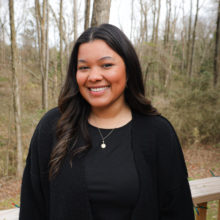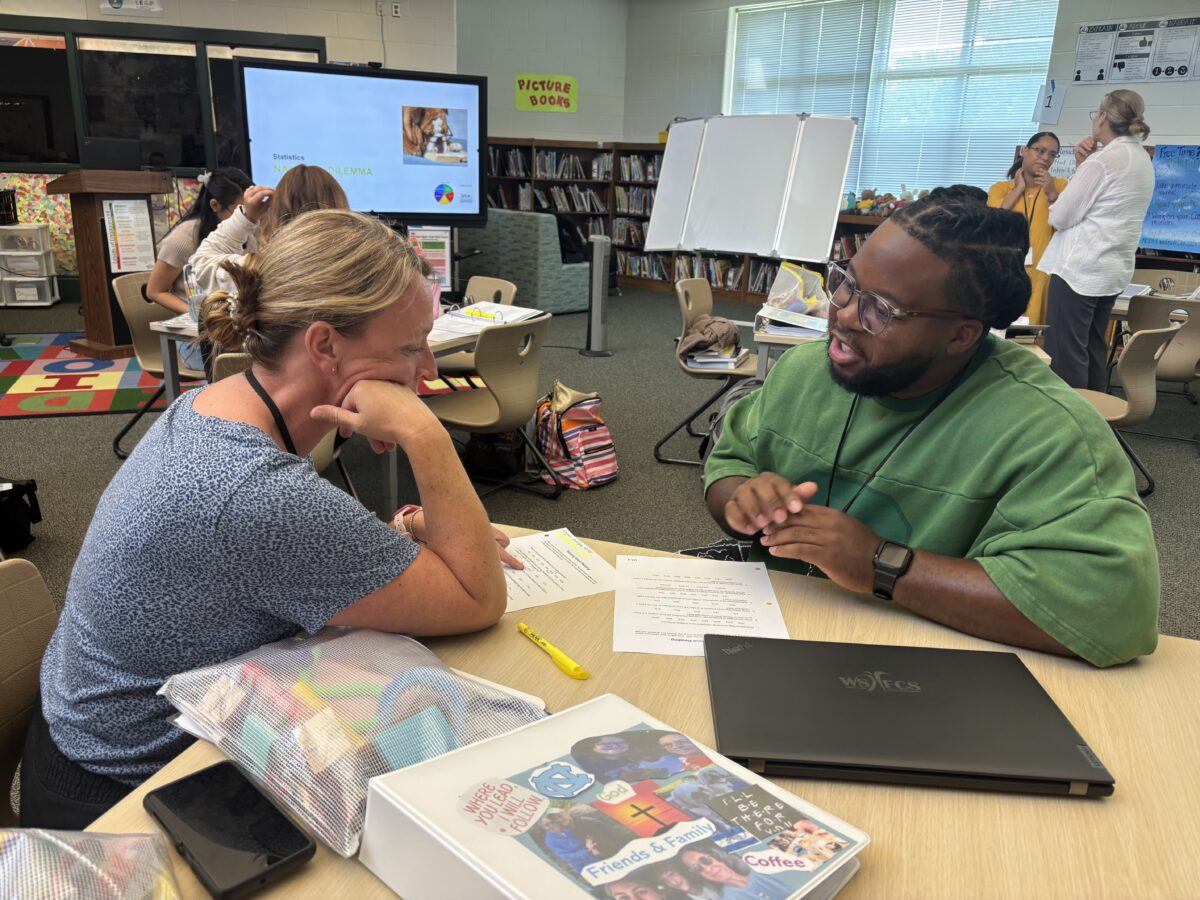
An Education Preparation Program (EPP) is a program offered by an institution or organization that prepares, trains, and recommends candidates for teacher licensure.
Previously, the only EPPs available in North Carolina were through college- or university-affiliated programs; however, legislation enacted in 2017 created more flexible pathways to teacher licensure. This opened the door for private organizations, community colleges, and even school districts to offer EPPs.
According to the North Carolina Department of Public Instruction (DPI) EPP dashboard, 62 EPPs currently enroll students. The dashboard says that 15,404 people were enrolled in an EPP in North Carolina in 2024. This includes students enrolled in traditional pathways — those that involve enrolling in a degree-seeking education program and are more focused on content and pedagogy. More than 8,000 students are enrolled in a licensure-only EPP, while 5,319 are enrolled in an undergraduate EPP.
“We’re thrilled to have lots of opportunities for folks who are interested in joining the teaching profession,” Andrew Sioberg, director of educator preparation at DPI, said.
Here’s the full list of DPI-approved programs in North Carolina.
![]() Sign up for the EdDaily to start each weekday with the top education news.
Sign up for the EdDaily to start each weekday with the top education news.
According to DPI’s latest State of the Teaching Profession report, there were 4,739 residency licensed teachers in North Carolina in March 2023. DPI describes a residency license as a pathway that “allows qualified individuals to obtain a teaching position and begin teaching right away as a Resident while obtaining a clear professional educator’s license.”
Residency licensure allows educators to be employed in a North Carolina public school while completing an EPP. Most educators in alternative EPP programs hold a residency license.
The report found that teacher vacancies on the 40th day of the 2023-24 school year totaled 7,141. The state’s current attrition rate is 9.88%, which is down from 11.45% the previous year.
While the attrition rate is down, there are still thousands of vacancies across the state, so understanding how future educators can enter the profession — and stay — is important.
You can take a look at DPI’s EPP Dashboard here.

DPI partners with Teach NC, which is a “one stop shop” to help educators understand their EPP options and path to licensure step by step.
Here’s the Teach NC dashboard. You can filter by program, licensure type, and subject area and see tuition and other costs all in one place.
Alternative EPPs
When the laws around EPPs changed, Sioberg said it made an inflexible path to licensure more flexible by “allowing more opportunities for educators to have, essentially, more choices.”
Sioberg explained that students enrolled in alternative routes typically already have a bachelor’s degree and are entering the profession with content knowledge, but not pedagogy knowledge. These educators can enroll in an EPP to start their pathway to licensure and thus learn pedagogy and prepare for the required state licensure exams.
“They are essentially taking folks who already have a degree and providing the pedagogy component so they are adequately prepared to be in front of kids in a classroom,” Sioberg said.
One example of an alternative pathway is ‘Want More? Do More!’ — a new online EPP founded by the leaders of Henderson Collegiate, a public charter school in Vance County. Here’s EdNC’s look at the program.
The program can be completed in one year, and tuition is $5,000 up front or $5,500 if you make quarterly payments. Depending on the licensure area, educators in the program take up to 17 or 18 courses.
Classes start in September, and applications are open now.
The Pathway to Practice NC EPP is a collaboration between the University of North Carolina at Chapel Hill School of Education and the North Carolina State University College of Education. Diana Lys, assistant dean for educator preparation and accreditation at the UNC School of Education, said Pathway to Practice NC is “a coherent, comprehensive and forward-thinking licensure program” designed to better serve residency licensed teachers.
Pathway to Practice NC accepts students on a rolling basis, is 100% online and self-paced, and is comprised of a series of 35 competency-based online modules that focus on pedagogical content knowledge and edTPA completion.
Educators are paired on day one with facilitators who evaluate and coach them throughout their time in the program. These facilitators are typically doctoral students at UNC and N.C. State who are former classroom teachers.
According to Lys, Pathway to Practice NC has a 100% pass rate for the edTPA and an 87% pass rate for Pearson/Praxis exams. The total cost of the program is $5,000. Educators enrolled in the program come from more than 90 school districts and charter schools across the state. According to Lys, 383 educators have completed the program, and 292 are currently enrolled.

Here is a list of approved alternative pathways, according to DPI’s dashboard:
- Aspire Teacher Prep
- iteach North Carolina
- KIPP NC Teacher U
- Moreland University
- Pathway to Practice NC
- Teachers of Tomorrow
- #T.E.A.C.H.
- Want More? Do More!
Alternative pathways: Community colleges
Community colleges in the North Carolina Community College System (NCCCS) first offered EPPs in fall 2023. At that time, just seven colleges did so. Today, 20 community colleges in North Carolina offer an EPP, and eight more are expected to enroll students in the 2025-26 school year.
According to the NCCCS dashboard, 244 students are enrolled in an EPP at one of the state’s community colleges.
Central Piedmont Community College has the highest EPP enrollment of any community college, with 46 students enrolled in spring 2025. The program started in fall 2023 with five students but has grown each semester and expects to have over 100 students actively enrolled this fall. Like Central Piedmont, most community colleges offering EPPs see consistent or steady enrollment.
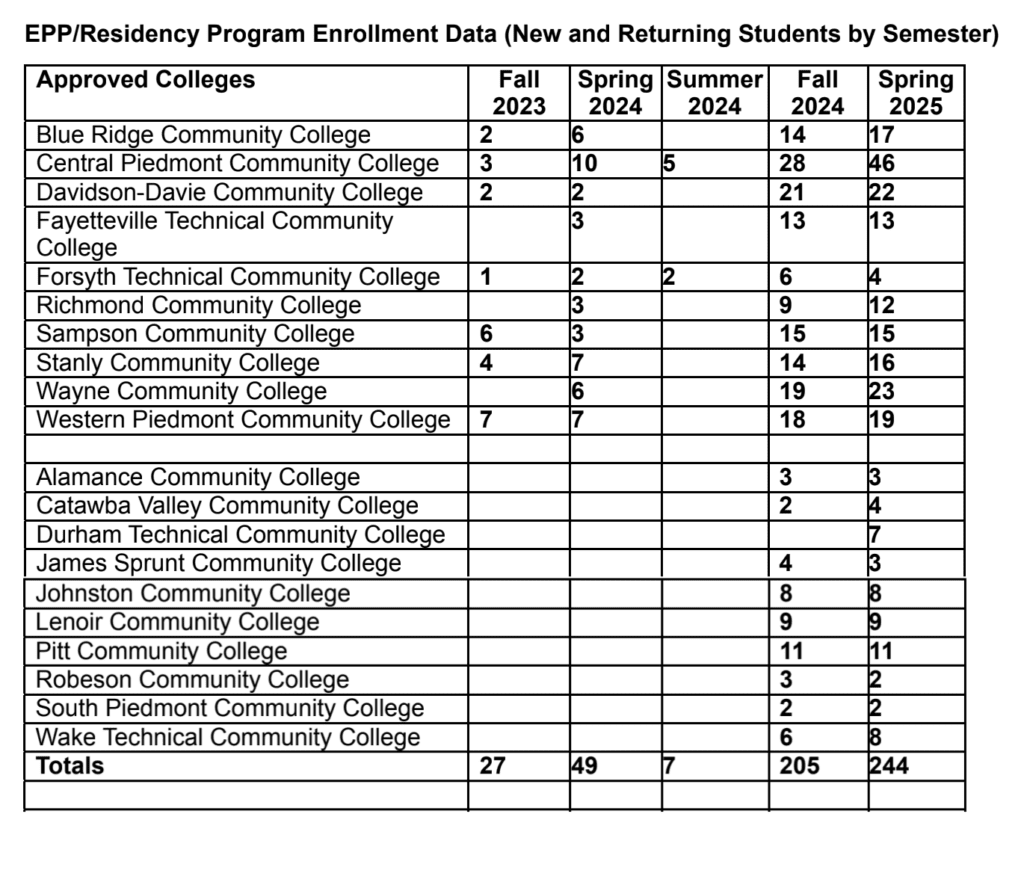
Wake Technical Community College offers its EPP in an online and synchronous format, so while class times are rigid, educators can join remotely. Educators enrolled at Wake Tech have access to all of the resources at the college, like the on-campus library and reading rooms.
Dr. Ileetha Groom, director of K-12 education at Wake Tech, said that skilled, well-qualified teachers are needed now more than ever.
“Many new teachers transition from other professions. Our new program will prepare them by focusing on literacy, STEM, and classroom management skills,” Groom said.
Here’s a sample program planning guide for the Wake Tech EPP.
You can learn more about Wake Tech’s program here.
NCCCS offers EPPs that can be completed in as quickly as one year or up to three years, depending on the educator’s needs. Colleges can offer courses online, in-person, or in a hybrid format, while also being able to modify course delivery to fit educator needs.
Among other requirements for admission, according to NCCCS, candidates must:
- Apply to the program through CFNC,
- Have completed a bachelor’s degree with a 2.7 GPA or higher,
- Have completed 24 hours of coursework in the requested licensure area OR passed the North Carolina State Board of Education (NCSBE) required content area examination(s), and
- Be employed by a local school district.
To offer an EPP, each college must go through the approval process individually, though they all adhere to a framework designed by NCCCS. The framework, called Cultivating Carolina Classrooms, allows school districts to “hire and retain local talent who might otherwise seek employment outside of their home community” and ensures that the programs are cohesive across the system.
Mary Olvera, state director of teacher education at NCCCS, said the success of the community college EPPs lies in how the colleges support educators.
“I’m very happy with the way that students are supported,” Olvera said. “Our programs are being successful because we do provide that coaching and we do provide that support.”
The EPPs typically consist of six classes totaling 18 credit hours, but colleges can make individualized modifications as needed. The cost of the programs vary depending on the institution but follows each college’s tuition rates.
The following community colleges offer an EPP:
- Blue Ridge Community College
- Central Piedmont Community College
- Davidson-Davie Community College
- Fayetteville Technical Community College
- Forsyth Technical Community College
- Richmond Community College
- Sampson Community College
- Stanly Community College
- Wayne Community College
- Western Piedmont Community College
- Alamance Community College
- Catawba Valley Community College
- Durham Technical Community College
- James Sprunt Community College
- Johnston Community College
- Lenoir Community College
- Pitt Community College
- Robeson Community College
- South Piedmont Community College
- Wake Technical Community College
The following community colleges have been approved to offer an EPP during the 2025-26 school year:
- Brunswick Community College
- Cape Fear Community College
- Central Carolina Community College
- Cleveland Community College
- Guilford Tech Community College
- McDowell Technical Community College
- Rowan-Cabarrus Community College
- Sandhills Community College
Alternative pathways: In-district EPPs
There are a handful of school districts that have in-house EPPs:
- Charlotte-Mecklenburg Schools (CMS) Teaching Residency
- Guilford County Schools-Alternative Certification Track
- CCTI: Wake-Durham
- Winston-Salem/Forsyth County Schools (WC/FCS) Teacher Residency Program
The WS/FCS Teacher Residency Program is a 10-month accelerated program for educators in the district who need to pursue an alternative pathway to licensure. According to Karen Morris, the program’s director, 70% of first-year teachers in WS/FCS come in without a license. This means getting educators through an EPP and fully licensed is imperative.
Morris explained that while preparing educators for the classroom is important, so is equipping them to stay in the classroom.
“Part of our mission is to recruit, prepare, and retain. We tell them that from the beginning, and we teach them: ‘Here are some things you can do to be able to not get overwhelmed. Here are the people that you call if you’re feeling overwhelmed. Let’s work together,’” Morris said.
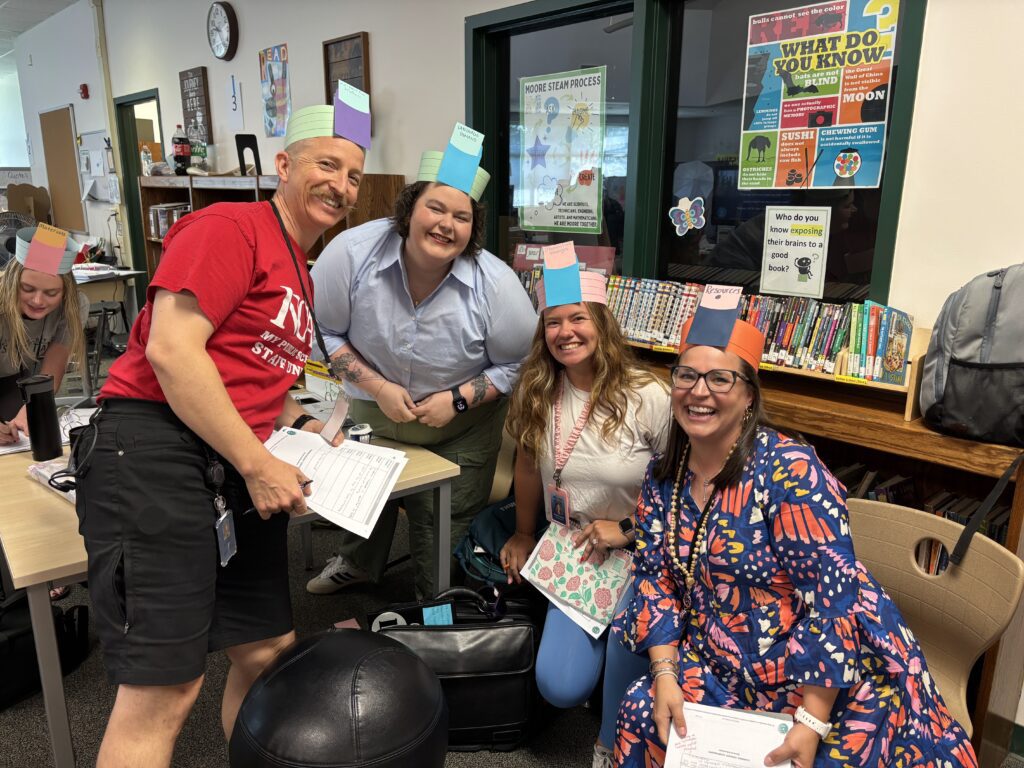
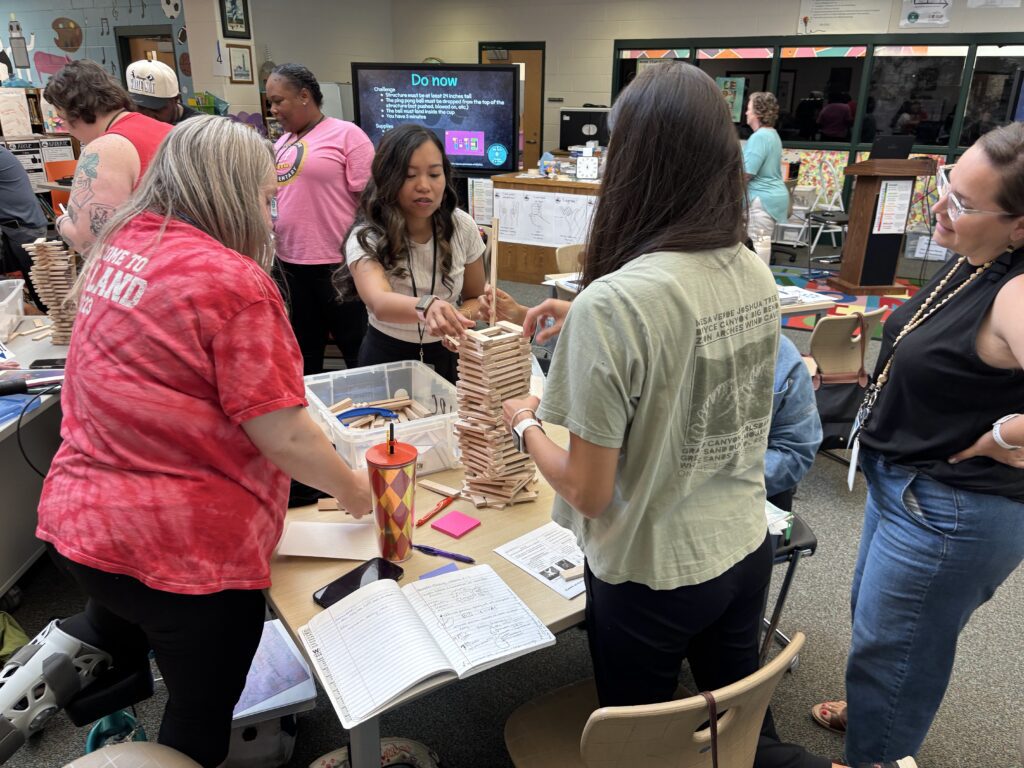
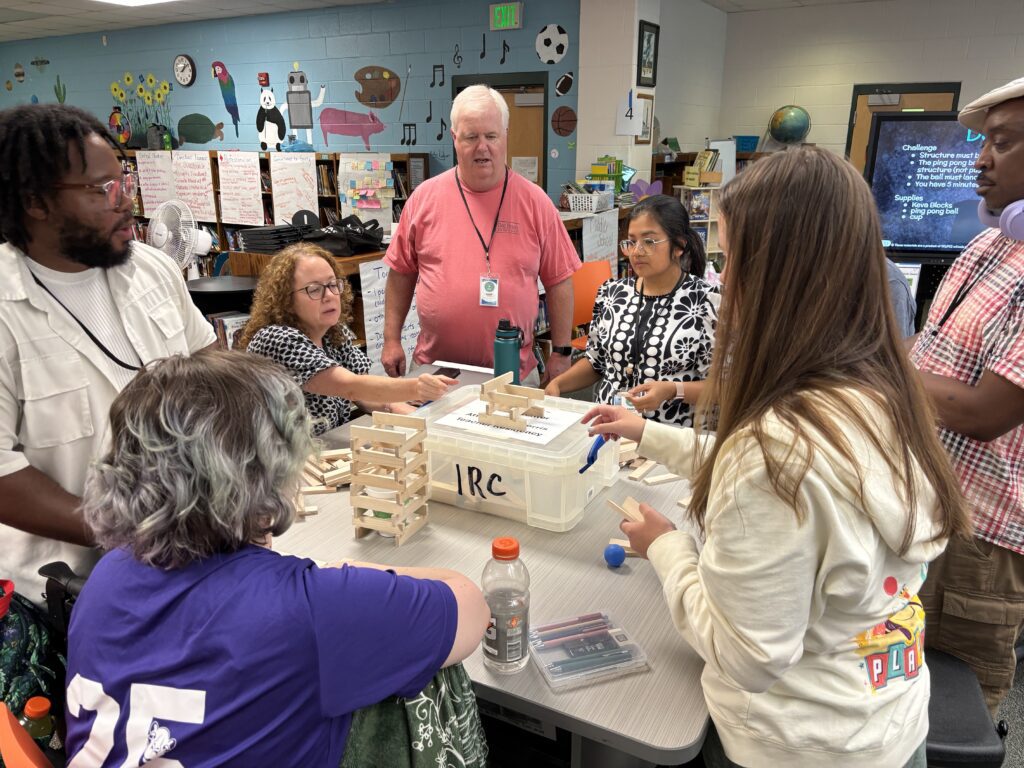
The program at WS/FCS is a rigorous one. Educators, who are teachers of record in the district with a residency license, apply between August and March and are accepted by April 10. In the summer, the cohort attends a six-week summer institute where they learn pedagogy, attend coaching sessions, and prepare to enter the classroom. They design lesson plans, parent and family communication plans, welcome letters, and other materials that they’ll use in their classrooms.
Morris said the summer institute is designed to be engaging and allows teachers to learn cooperative learning strategies that they can implement in their teaching. It’s not a “sit and get” program.
The summer institute runs Monday through Thursday from 8 a.m. to 4 p.m. In the school year following the summer institute, educators complete a clinical residency. In the fall, they meet in person for two hours a week and complete online modules. By spring, they’re working on completing their edTPA portfolios.
The first cohort started the summer before the 2023-24 school year, and 22 educators were enrolled. Out of that cohort, 90% passed the edTPA, and 82% have passed the required state tests in their licensure area. In the second cohort, 100% passed the edTPA, and 56% have passed the required state tests.
The program cost is $3,000, which can be paid in installments or at once.
Here are the requirements for the Winston-Salem-Forsyth County Schools Teacher Residency Program.
CMS also offers a teaching residency for educators in its district. CMS has upcoming webinars about alternative licensure pathways.
Traditional EPP pathways
According to the DPI’s list of approved programs, 16 public institutions of higher education and 32 private institutions of higher education currently offer EPPs in North Carolina. Two online institutions of higher education, Phoenix University and Western Governors University, offer EPPs in North Carolina as well.
Traditional pathways are those that culminate in a bachelor’s degree and full licensure upon graduation.
Some institutions of higher education in North Carolina also offer licensure-only pathways.
EPP accountability
At the February 2025 meeting, the N.C. State Board of Education asked the Professional Educator Preparation and Standards Commission (PEPSC) to re-examine the EPP accountability model, which had been approved by the Board in August 2020.
At its August 2025 meeting, the Board heard a presentation on changes proposed to the model, which take into account feedback from EPPs and school districts.
The recommended model prioritizes continuous improvement focused on ensuring high quality regardless of program size, according to the presentation. The model doubles the number of measures, from three to six; addresses EPPs with small sample sizes; differentiates traditional and residency programs; and eliminates emphasis on subgroups.
The proposed changes would require a change in current law. The Board voted to remand the model back to PEPSC for further review.
Recommended reading


